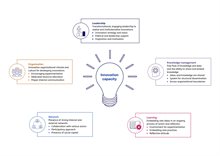What do we mean by innovation capacity?
We define innovation capacity as the combination of competencies and conditions that enable and support innovation within public organisations. We approach this through a framework consisting of five elements:
- Leadership: Transformational and inspiring leadership that enables and prioritises innovation.
- Organisation: An innovative culture that encourages experimentation and collaboration, with room for failure and learning.
- Network: Strong internal and external networks, participation and social capital.
- Knowledge management: Structural exchange and embedding of knowledge and data across departmental boundaries.
- Learning: An environment that continuously provides space for reflection and puts learning at the centre.
Four steps to greater insight and innovation capacity
At TNO Vector, we – together with cities across Europe – have developed a method to support public organisations in strengthening their innovation capacity. Not by offering ready-made solutions, but by guiding them through a learning process that leads to insight, strategy and action.
Public organisations go through this process in four steps. It begins with a joint exploration of the organisation’s current position: what is working well, and what are the pain points? Next, we reflect on the underlying patterns and identify the challenges: what makes things difficult, or successful? These may relate to more abstract issues (for example, an organisational culture that prioritises politically urgent tasks over long-term processes), but also to very concrete barriers, sometimes almost at a personal level (such as: my manager evaluates my work on hours, budget and tangible results, but the innovation project I’m involved in is inherently less predictable than installing new green spaces in the city).
We then jointly select strategies that fit the context of the people at the table (such as their role, mandate and ambition), as well as the organisation’s context, goals and vision. Finally, we formulate an action plan that creates ownership and momentum.
This approach helps public organisations get to the heart of their successes and challenges. It provides a common language to discuss the type of work they do; work that is often complex, politically sensitive and cross-domain. Throughout the process, each step introduces vocabulary that makes implicit resistances, successes or challenges explicit, making them more visible and actionable. By reflecting together, space is created for new perspectives and shared understanding.
‘Even with years of experience in urban mobility innovation, working on innovation capacity in this way offered surprising value. The real benefit wasn’t just in the tools or frameworks but in the exchange of ideas and shared experiences with participating colleagues from the city. Discussing common frustrations, understanding resistance, and learning from each other’s successes and failures created a sense of camaraderie and safety that has carried over into our daily work. This strengthened innovation capacity will play a key role as we continue working towards a climate-neutral city.’
Suzanne Green, Project Manager EU Projects at City of Gothenburg
Our method is applicable in a wide range of contexts and offers practical tools for public organisations that want to innovate. Want to learn more? View the brochure here.





